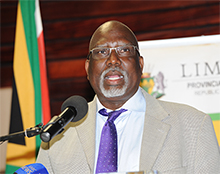News & Media
Unisa building named in honour of Simiso Nkwanyana
In keeping with the spirit of renewal and transformation, the University of South Africa (Unisa) recently paid homage to the late Simiso Nkwanyana, a student leader at the university who went on to leave a lasting legacy in both provincial and national politics, by naming the building housing the university’s Durban Regional Hub after him.
The auspicious naming ceremony was held on Friday 12 July 2019, and was attended by, among others, Thulas Nxesi, Minister of Employment and Labour and National Deputy Chairperson of the South African Communist Party (SACP); Sihle Zikalala, Premier of KwaZulu-Natal; Sakhi Simelane, Chairperson of the Unisa Council; Prof Mandla Makhanya, Unisa Principal and Vice-Chancellor; and Wadzanai Mazhetese, President of Unisa’s National SRC.

Back, from left: Prof Mandla Makhanya, Unisa Principal and Vice-Chancellor, Dr Phasoane Mokgobu, Vice-Principal: Institutional Development, Sakhi Simelane, Chairperson of Council, Khayelihle Nkwanyana, family representative and Dr Sibusiso Chalufu, Acting Executive Director: Student Affairs and Regional Services
Front, from left: Pastor Salatiel Nkwanyana, Gcina Nkwanyana, Sihle Zikalala, Premier of KZN, and Thulas Nxesi, Minister of Employment and Labour and Deputy National Chairperson: SACP
As a national and African treasure, Unisa takes very seriously its duty to be representative of the diverse communities that it serves. With this in mind, Unisa has embarked on an exciting initiative of naming and renaming new and existing facilities in keeping with the spirit of renewal and transformation. The naming ceremony at the Durban Regional Hub was the first of a series taking place at Unisa’s campuses nationwide.
Addressing more than 200 guests, Minister Thulas Nxesi urged Unisa’s management to consider protecting student leaders from unscrupulous business people who often corrupt student leaders when they sit on the tender committees of various universities. As the event was well attended by current and former student leaders, he emphasised that student leaders are vulnerable to corrupt business people who often buy favours in order to win tenders at universities. The minister called on student leaders to emulate the leadership qualities of Nkwanyana by remaining incorruptible and principled leaders who are not in leadership positions for personal gain.

Sihle Zikalala, Premier of KZN, and Khayelihle Nkwanyana, family representative, unveiling the plaque at the newly named building
Premier Sihle Zikalala described Nkwanyana as a leader who would not grandstand to make his point heard. He said Nkwanyana was able to make his argument heard without insulting or disrespecting others.
Sakhi Simelane indicated that the Unisa Council was deeply committed to the transformation imperative of the university, part of which culminated in the adoption of a Policy on Naming and Renaming Unisa Facilities and Properties. "The policy is designed to ensure different stakeholders’ inclusiveness, transparency, fairness of the naming and renaming process," he said. "This process is in line with overall strategic goals and objectives of the university to position Unisa as the African university that is committed to transformation and social cohesion, to redress the imbalances of the past, thus naming and renaming facilities in a coordinated and inclusive manner."
Prof Mandla Makhanya listed some of Nkwanyana’s major contributions. "Nkwanyana and his comrades successfully lobbied for acceptance by Unisa that its students deserved some form of teaching and learning support," he said. "Hence, for the first time in its history, the university began to offer tutorial support for those young students. Through their direct effort, the students went on to negotiate with the Tertiary Education Student Fund of South Africa (TEFSA), the predecessor to the National Student Financial Aid Scheme (NSFAS), to recognise that working-class Unisa students were just as deserving to receive financial support as their counterparts at contact universities. Importantly, Nkwanyana and his comrades brought about the recognition of the SRC, and eventually the National SRC, as the legitimate representative and voice of Unisa’s students."
Makhanya said it was against this background that Nkwanyana was elected the Co-Convener in 1995 of what was known as the Unisa National Student Coordinating Committee (UNSCC), charged with coordinating and preparing all SRCs to formally come together and establish the National SRC.
Speaking on behalf of the family, Khayelihle Nkwanyana, younger brother of Simiso, said his family was grateful for and honoured by the gesture the university has made in honouring his brother. He narrated how his brother began political activism at an early age when he was still at school as he questioned certain programmes which at that time forced leaners to attend school-break youth camps. These camps were used to indoctrinate leaners towards a dominant KwaZulu Bantustan political party.
Attendees described this event as the beginning of an important transformation the university was undertaking to indeed affirm its status as the African university in the service of humanity, not only in words, but also in practice.
* By Siyabonga Seme, Manager: Communication & Marketing, Unisa KwaZulu-Natal Region
Publish date: 2019/07/16

 Unisa co-hosts G20 community outreach in the Eastern Cape
Unisa co-hosts G20 community outreach in the Eastern Cape
 Unisans gain membership of prestigious science academies
Unisans gain membership of prestigious science academies
 Advocating for disability transformation through servant leadership
Advocating for disability transformation through servant leadership
 Unisa Press continues to illuminate the publishing space
Unisa Press continues to illuminate the publishing space